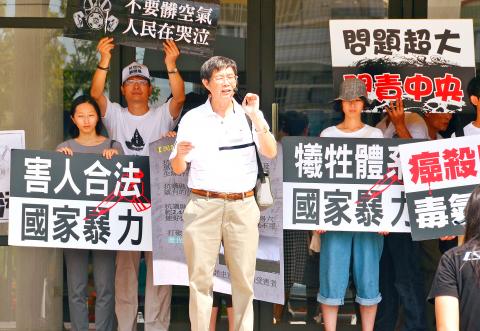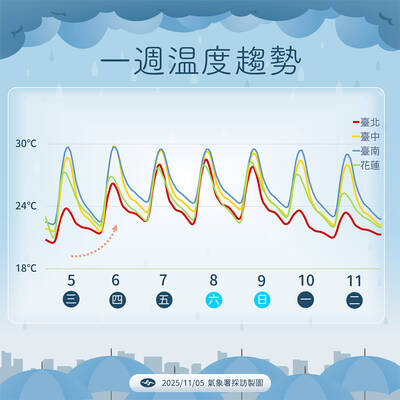Environmental campaigners yesterday rallied in front of the Yunlin County Government building to protest against what they said was the local government’s “indifference” to public health after it last week allowed two coal-fired power plants owned by Formosa Plastics Group (FPG) to continue burning bituminous coal until 2017.
At the rally, Robert Lin (林春強), an academic contracted by the county government and serving on a committee monitoring operations at the FPG-owned sixth naphtha cracker complex — where the plants are situated — announced his resignation and tore up his contract.
Lin, enlisted by former Yunlin County commissioner Su Chih-fen (蘇治芬), said that his contract is valid until the end of the year, but that county government officials had not once met with committee members to seek their opinion on the permits since Yunlin County Commissioner Lee Chin-yung (李進勇) assumed office more than seven months ago.

Photo: CNA
Instead, Lee’s administration has assembled an opaque “counseling committee” that allegedly held several closed-door meetings with FPG regarding the permits, he said.
He said that Lee is not serious about banning the use of soft coal and petroleum coke, which was outlawed by a bylaw passed by the county council last month.
The commissioner has rejected Lin’s advice that he deny FPG the permits by exercising his administrative power and insisted on resolving the matter by starting a legal battle with the central government over the legitimacy of the bylaw.
The Executive Yuan and the Environmental Protection Administration have spoken out against the bylaw, saying that it contradicts the power of central government.
“By the time the verdict is handed down, Lee’s term as commissioner will have ended,” Lin said.
He said that instead of using his authority to reject the firm’s application, Lee used it to push back the deadline for ceasing to burn soft coal at the cost of public health.
Furthermore, county government officials who attended meetings to review FPG’s application to extend the permits ignored his suggestion that coal being consumed in the complex be replaced with more environmentally friendly anthracite, which has a high coal content, but low impurities, Lin said.
He also questioned whether there is any connection between the county government agreeing to extend the permits and a NT$240 million (US$7.7 million) road maintenance fund, which FPG reportedly promised the county government on Friday last week, just two days after the government approved the permits.
Lin said that Su, similarly, obtained funding from FPG to promote agricultural safety, which led the Control Yuan to issue a corrective measure against the county government over possible connivance with the firm.
“Can you [Lee] still dutifully monitor the sixth naphtha cracker after accepting cash from FPG?” Lin asked.
In response, the county government said that the road maintenance fund had been set up by FPG in 2010 and that it had nothing to do with the permit extensions.
The county government would strictly monitor emissions from the naphtha cracker complex by monitoring the amount of coal consumed, polynuclear aromatic hydrocarbons, heavy metals, sulfur content and particulates of less than 2.5 micrometers at the power plants, it said.
Lin was the second academic, after former county environmental protection adviser Chang Tzu-chien (張子見), enlisted by the county government to have resigned in protest over the extension of the permits.

Three Taiwanese airlines have prohibited passengers from packing Bluetooth earbuds and their charger cases in checked luggage. EVA Air and Uni Air said that Bluetooth earbuds and charger cases are categorized as portable electronic devices, which should be switched off if they are placed in checked luggage based on international aviation safety regulations. They must not be in standby or sleep mode. However, as charging would continue when earbuds are placed in the charger cases, which would contravene international aviation regulations, their cases must be carried as hand luggage, they said. Tigerair Taiwan said that earbud charger cases are equipped

Foreign travelers entering Taiwan on a short layover via Taiwan Taoyuan International Airport are receiving NT$600 gift vouchers from yesterday, the Tourism Administration said, adding that it hopes the incentive would boost tourism consumption at the airport. The program, which allows travelers holding non-Taiwan passports who enter the country during a layover of up to 24 hours to claim a voucher, aims to promote attractions at the airport, the agency said in a statement on Friday. To participate, travelers must sign up on the campaign Web site, the agency said. They can then present their passport and boarding pass for their connecting international

UNILATERAL MOVES: Officials have raised concerns that Beijing could try to exert economic control over Kinmen in a key development plan next year The Civil Aviation Administration (CAA) yesterday said that China has so far failed to provide any information about a new airport expected to open next year that is less than 10km from a Taiwanese airport, raising flight safety concerns. Xiamen Xiangan International Airport is only about 3km at its closest point from the islands in Kinmen County — the scene of on-off fighting during the Cold War — and construction work can be seen and heard clearly from the Taiwan side. In a written statement sent to Reuters, the CAA said that airports close to each other need detailed advanced

UNKNOWN TRAJECTORY: The storm could move in four possible directions, with the fourth option considered the most threatening to Taiwan, meteorologist Lin De-en said A soon-to-be-formed tropical storm east of the Philippines could begin affecting Taiwan on Wednesday next week, the Central Weather Administration (CWA) said yesterday. The storm, to be named Fung-wong (鳳凰), is forecast to approach Taiwan on Tuesday next week and could begin affecting the weather in Taiwan on Wednesday, CWA forecaster Huang En-hung (黃恩鴻) said, adding that its impact might be amplified by the combined effect with the northeast monsoon. As of 2pm yesterday, the system’s center was 2,800km southeast of Oluanbi (鵝鑾鼻). It was moving northwest at 18kph. Meteorologist Lin De-en (林得恩) on Facebook yesterday wrote that the would-be storm is surrounded by